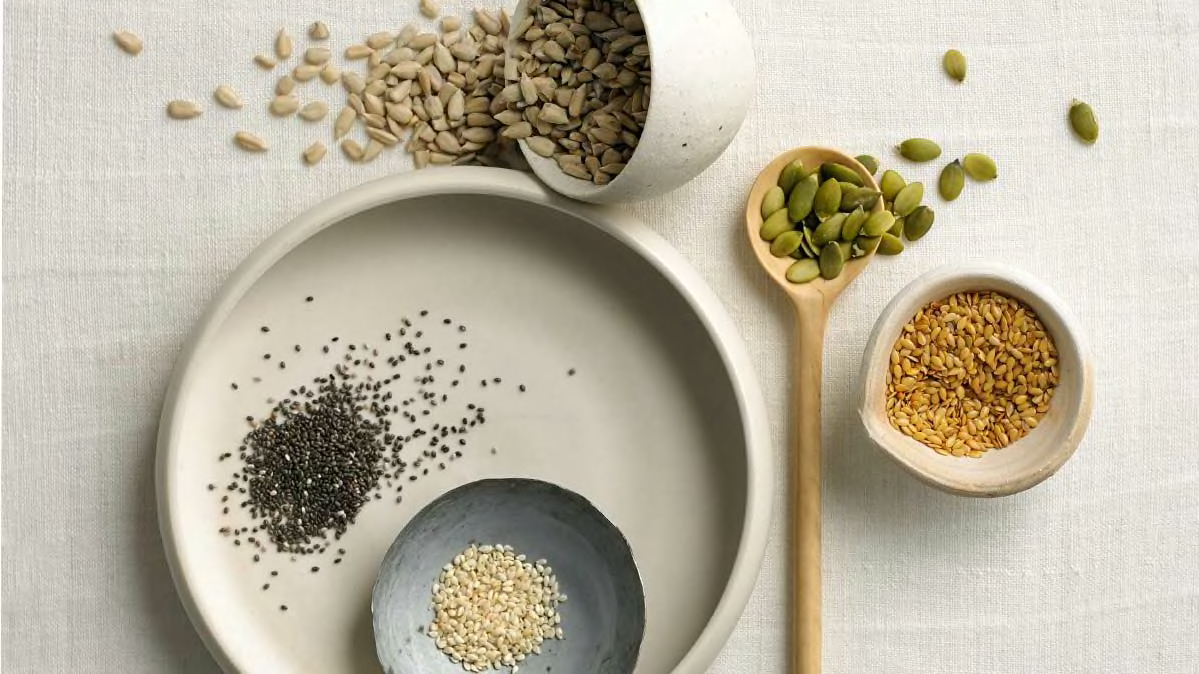
Super nutrition can come in small packages. Just look at seeds, the latest dietary darling. "Seeds offer a ton of nutritional benefits, from helping with cholesterol levels to fighting off inflammation and infections to contributing to steady blood sugars," says Katherine Basbaum, M.S., R.D., a clinical dietitian for the Heart and Vascular Center at UVA Health in Charlottesville, Va. And this tasty trend is appearing everywhere, including in breads and puddings.
What makes seeds so good for you? Their high concentration of healthy fats, for one thing. "Seeds also contain dietary fiber, some protein, and a variety of antioxidants," says Jackie Newgent, R.D.N., a culinary nutritionist in New York City and author of "The Clean and Simple Diabetes Cookbook" (American Diabetes Association, 2020). Each has unique benefits and nutrients to offer. Here are a few favorites to consider.
Chia Seeds
"Fiber is a major standout in chia seeds, with nearly 10 grams in just 1 ounce," Newgent says. And they're a top source of plant-based omega-3 fatty acids.
Try them: Mild in flavor with a crunch like poppy seeds, chia seeds can be added to smoothies or other liquids, which makes them swell to a gel-like consistency. Use them to stretch eggs in recipes for baked goods; 1 tablespoon soaked in 3 tablespoons of water for 10 minutes equals one egg. They also make for a healthy pudding: Whisk together 3 tablespoons chia seeds, 3⁄4 cup low-fat or nonfat milk or unsweetened fortified soy milk, ¼ of a very ripe banana, mashed, and 1 teaspoon maple syrup. Refrigerate at least 2 hours and stir before serving. Top with chopped walnuts and another teaspoon of maple syrup.
Flaxseeds
Rich in ALAs, flaxseeds are also a good way to get lignans, a fiberlike compound with antioxidant properties that may lower the risk of heart disease and some cancers.
Try them: Grinding makes them easier to digest and boosts nutrient absorption. Ground flaxseed can sub for breadcrumbs; use as a coating on baked chicken or fish, or sprinkle on pasta dishes.
Pumpkin Seeds
Nutritionwise, it's hard to beat pumpkin seeds. You get 9 grams of protein and 45 to 60 percent of the daily need for muscle-relaxing magnesium in ¼ cup.
Try them: Roast and use seeds in salads in place of croutons, in grain dishes, or on their own as a crunchy snack. Look for seasoned varieties, whether sweet or spicy. Shelled pumpkin seeds may be labeled as pepitas.
Sesame Seeds
You get 22 to 31 percent of your daily need for zinc—which helps keep your immune system strong—and 23 percent of iron in just 3 tablespoons.
Try them: Toasted, they have a deep, nutty flavor that complements steamed veggies and stir-fries. Or whisk ground sesame paste (tahini) with warm water and lemon juice for a creamy dressing.
Sunflower Seeds
"Sunflower seeds are an excellent source of vitamin E, a fat-soluble vitamin that provides antioxidant and immune-boosting effects," Basbaum says. A quarter-cup also has 7 grams of protein.
Try them: Their mild flavor and tender texture make them a suitable alternative to pine nuts in homemade pesto, but they cost less, have fewer calories, and pack more protein per serving.
An Easy Seed Snack Mix
This flavored dry-seed mix is great to munch on at home. You can also use it as a topping for yogurt, oatmeal, or salads.
1 cup pumpkin and sunflower seeds
2 Tbsp. sesame or flax seeds, or both
1 tsp. oil (sunflower or any type)
1 tsp. maple syrup
Pinch of salt
½-1 tsp. of spices like cinnamon, chili powder, paprika
Preheat oven to 250° F. Toss all ingredients together in a bowl. Spread on a baking sheet and bake 10 to 20 minutes, tossing every 5 minutes, until dry.
Editor's Note: This article also appeared in the June 2020 issue of Consumer Reports On Health.
















